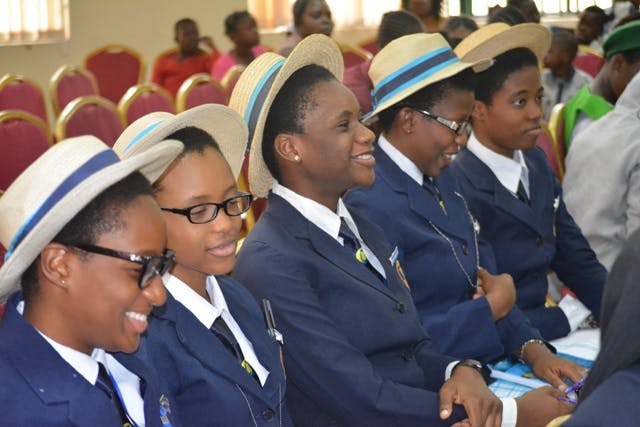Day of the African Child
May 28, 2019
Story

This year, NACCRAN marked the DAC with the Human Right Commission with the theme Accelerating our collective efforts to end child marriage in Africa. The event started at 11:00am with the national anthem and an opening remark from Mrs Aver Gavar who noted that there has been a rise in the area of child marriage and Nigeria falls into one of the countries mostly affected. Mrs Margaret Udoh, the coordinator of NACCRAN FCT gave a brief about the origin of the celebration. She stated that the Day of the African Child has been celebrated on June 16 every year since 1991, when it was first initiated by the Organization of African Unity. It honors those who participated in the Soweto Uprising in 1976 on that day. It also raises awareness of the continuing need for improvement of the education provided to African children. In Soweto, South Africa, on June 16, 1976, about ten thousand black school children marched in a column more than half a mile long, protesting the poor quality of their education and demanding their right to be taught in their own language. Hundreds of young students were shot, the most famous of which being Hector Peterson (see image). More than a hundred people were killed in the protests of the following two weeks, and more than a thousand were injured. On June 16th every year, governments, NGOs, international organizations and other stakeholders gather to discuss the challenges and opportunities facing the full realization of the rights of children Africa. (Wikipedia, the free encyclopedia).
The Executive Secretary of the commission, Prof. Bem Angwe, who was represented by his Special Assistant, Mr Harry Obe, said that early and forced marriage could represent a threat to both the child and the society. ``Statistics show that 15 out of 20 countries with the highest rate of early child marriage are in Africa. Early and forced marriage is any marriage before the age of 18. ``It is a marriage where one of the parties does not have the power to prevent or end. ``Early and forced marriage is a serious human rights abuse, which threatens not just children, but the society at large. ``This menace undermines the rights and development of children as it impacts on their emotional, physical, psychological, health, education, economic well-being and dignity. ``Critical human rights violated by this practice include the rights to education, the right to health, the right to family, equality and non-discrimination, employment, freedom of movement, freedom from violence and access to reproductive and sexual health care. ``Child marriage contravenes critical human rights international and regional instruments like the Universal Declaration of Human Rights, the Child’s Rights Convention, the African Charter on the rights and the Welfare of the Child, etc.`` The executive secretary expressed optimism that Nigeria could achieve the eradication or mitigation of child marriage through the various legal platforms and frameworks available to it.
This was followed by some performances of poetry by children of child brigade who spoke about the arms of child marriage. Next was a panel discussion by school children (child’s brigade, Lead British International School, Regina Pacis college, Government secondary school Garki and Government Secondary school Tudun wada) on child marriage, the effects, solutions and interventions by the government. Some of the effects of child marriage mentioned by children are depression, forced slavery, educational deprivation leading to high level of illiteracy, inferiority complex, hatred to self and society which leads to terrorism, mental damages, health challenges eg HIV/AIDS, VVF, cancer, and even death in some cases. Children called out on the government to enact and enforce laws against such evil practices. They also called out on independent judiciaries to be fair and impartial in their protection against violations. They also called out for government to create awareness programs that address this issue and promote free education especially for the girl child across the country. Speaking in an interview with the News Agency of Nigeria (NAN), Mary-Joy Soughul, a student of Regina Pacis College, Abuja, advised parents against forcing their children into early marriage for any reason. ``What I will advise parents is that they should not force their children into marriage because they are not helping them in any way instead they are bringing more harm and danger to their family in the sense that if you send your child into early marriage it can cause under development because let’s say the child wanted to be a doctor but because of what you have done, now she cannot become a doctor anymore. ``Or your son wanted to become let’s say a politician - and who knows he might be the president - but because of what you have done, your child will be stock with family issues - always thinking about the family. ``It can lead to so many harmful things and if parents do this, it can even lead to the death of the child and this can bring depression and sadness to the parents.
In conclusion, speaking on behalf of children, Miss Bassey from JSS Tunduwada stated that the children are the future. They are the assurance of the continuity of the human in the society. By this nature, they deserve protection from all. They lack the physical, mental and emotional maturity desired to face life. The children are the future leaders and the kind of leaders we have in future depends on the kind of children we have now. Abused, maltreated and neglected becomes stunted emotionally and physically and lack the confidence to face life. They are therefore deprived of the opportunities to develop their potentials.




